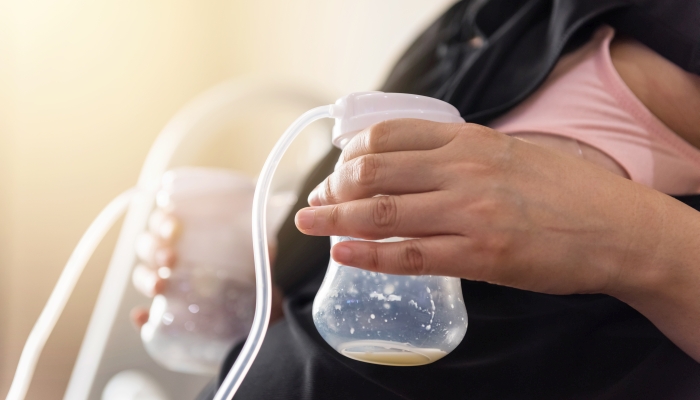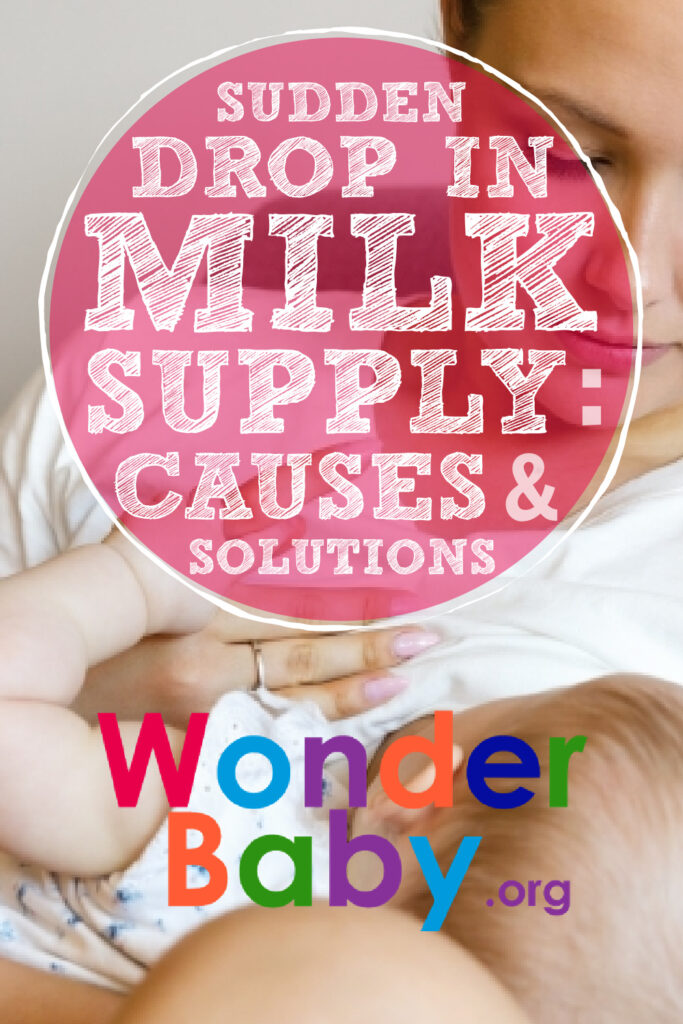Sudden Drop in Milk Supply: 4 Causes and Solutions

- Sudden drops in milk supply can be caused by stress, diet, hormonal imbalances, and some medical conditions.
- Eating healthy and taking supplements can improve your milk supply.
- Stress management and self care will help you avoid sudden drops in milk production.
- Your doctor can help you manage hormone imbalances and medical conditions that impact milk supply.
I returned to work from maternity leave at the same time as my best friend. One day, I went to our shared fridge with my pumped milk. I opened the fridge and saw that my friend had pumped a full bottle of breastmilk. I had only pumped one ounce.
I shouldn’t have compared my breast milk supply to hers, but I was devastated. I had always wanted to continue my breastfeeding journey for as long as I could. Providing my baby enough milk felt like a way to stay connected to her while I was at work.
I asked my doctor and searched online and found information about my sudden drop in milk supply: 4 causes and solutions. Following advice from my doctor and other moms online, I was able to pump enough milk. I was thrilled to be able to continue pumping and breastfeeding for almost a year after that supply drop incident.
Dealing With a Sudden Drop in Milk Supply
What to do if your milk supply suddenly dries up
Don’t panic if your milk supply suddenly drops. A sudden drop in milk production can happen to any breastfeeding mom. An occasional feeding or pumping session with less milk is completely normal.
Keep a journal of your milk production over time to look for patterns and trends. Track your water, calories, exercise, and stress levels to see if they correlate with your milk production.
Don’t worry that a low milk supply means that you can’t breastfeed anymore. A lactation consultant can help you work through issues with a sudden decrease in milk production. Although it takes time and patience, even mothers who stop breastfeeding can build up to a normal breast milk supply.
Average breast milk production
Milk supply changes according to your baby’s demand. Cluster feeding and power pumping increase milk production. When your baby ends a growth spurt or starts eating solid foods, your body doesn’t need to produce as much milk.
Most babies need about 30 oz of milk per day. A breastfeeding mom usually produces just enough to keep up with her baby’s schedule. A general rule for pumping is to pump about 1oz per hour that you will be away from your baby.
Baby’s total intake per day does not change much over time. As they grow your baby eats more during each session and can go longer between feedings. Below is a chart showing how much milk a baby should drink in one nursing session:
| Age | oz of breastmilk per feeding |
| 3 months | 3-4oz |
| 6 months | 4-5oz |
| 12 months | 4-6oz |
Signs that your milk supply has dropped
If you are exclusively pumping, it is easy to tell when your milk supply drops. If you are exclusively breastfeeding or using a combination of pumping and breastfeeding, it is hard to tell if you are producing less milk.
If your baby seems fussy at the breast, they may be frustrated that they aren’t getting more. Repeatedly latching and unlatching might signal a problem with milk flow.
Keeping track of your baby’s wet diapers is a good way to know if they are getting enough breast milk.
| Age | Wet diapers per day |
| 3 weeks | 7-12 |
| 3 months | 6-10 |
| 6 months | 8 |
| 12 months | 4-6 |
How long to exclusively breastfeed
The American Academy of Pediatrics recommends that mothers exclusively breastfeed for the first 6 months of their baby’s life, with continued breastfeeding for two years or longer. This can be done by breastfeeding, exclusively pumping, or a combination of nursing sessions and pumping.
Breastfeeding mothers produce milk that contains all the nutrients and enough calories for their infants up to six months old. After that, you should start to introduce a well balanced diet of baby safe foods.

4 Common Causes of a Decrease in Milk Supply
Mothers worried about breast milk supply should take a deep breath. Most supply issues are correctable. The most common causes of a decrease in milk supply include:
- Poor diet
- Stress
- Hormonal changes
- Medical conditions
Foods that cause low milk supply
Sleepless nights with a newborn might have you reaching for your coffee mug more often than usual. Unfortunately, caffeine can decrease your milk production.
Caffeine is a diuretic, meaning it makes your kidneys let go of more water. This can cause dehydration and lead to low milk supply. Breast milk is 80% water. If you are dehydrated, your body can’t make milk.
A processed food filled diet can also hurt your supply. It is not the processed food that is the problem, but the lack of nutrients. If you eat mostly highly refined foods, you miss the essential nutrients your body needs for you and your baby.
Stress causing a sudden drop in milk supply
Stress or anxiety can diminish your milk supply in a matter of hours. Some mothers get into a vicious cycle. Their stress lowers their milk supply, and then they stress more about their milk. The stress compounds and can lead to completely quitting breastfeeding.
Stress may also cause a decreased appetite. Not eating enough forces your body to use calories for basic body functions instead of making milk.
Many mothers are in a hurry to return to their pre-pregnancy body weight. They may eat too little or get too much exercise. While a healthy weight loss strategy is fine, doing too much too fast will hurt your milk supply.
Hormonal changes and breastfeeding
About four to six weeks after the delivery of your baby, it is safe to have sex again. It is important to consider birth control options when this happens. Some hormonal birth control like the patch and pill are linked to lowering milk supply.
Postpartum depression and its related hormonal changes can also cause your supply to suddenly drop. Women who suffer from postpartum depression generally have a harder time breastfeeding. This is partially due to stress, and partially due to rapid changes in hormones after delivery.
What Is the Impact of a Drop in Milk Supply?
Effects of a sudden drop in milk supply for mothers
Sudden decrease in milk flow can be stressful for mothers. There is a lot of pressure on moms to provide adequate milk supply for their babies. Moms who have supply difficulties also report having mental health difficulties.
Things like formula cost and shortages are also difficult to deal with. It is stressful to have to budget for formula when you had planned on breastfeeding. Formula can get expensive, especially during a growth spurt.
Effects of a drop in milk supply for babies
A baby’s diet is pretty simple during their first 4-6 months of life. They rely completely on formula or breastmilk supply. If your baby can’t get enough from the breast, they may become more fussy and agitated. If they do not get enough to eat for a long period of time, they may not grow or develop as they should.
Infant formula is a great option for babies who need it. It has enough calories and nutrients to help babies grow. However, formula is not exactly the same as breastmilk. Babies who are used to only breast milk may not tolerate a switch to formula.

4 Tips to Increase Your Milk Supply
Increasing your supply can be done using a few simple lifestyle changes.
- Consume the right food and supplements
- Manage stress
- Keep your hormones in balance
- Talk with your doctor
Foods to increase milk supply
The best thing you can do to get more milk flowing is to drink water. Since Breastmilk is mostly water, making sure you get enough will help you keep up a good supply.
The next best thing you can do is make sure your diet is full of whole grains, lean protein, fruits, and vegetables. A good breast-feeding meal might look like this:
- Grilled fish
- Brown rice
- Roasted vegetable
- Peaches and cream for dessert
For busy days, try to choose portable snacks with enough protein. Fruits, nuts, protein bars, and raw vegetables make great snacks for busy moms.
Oat milk and fennel seeds have been known to increase milk supply. You can easily mix them into a smoothie for a snack.
Supplements to help restore milk supply
Lactation tea and Lactation cookies are specially made to help with breast milk production. Ingredients in these teas and cookies include:
- Milk thistle
- Fenugreek
- Brewers yeast
- Ginger
Taking these supplements individually or as part of a lactation cookie/tea can help with supply.
Stress management for milk production
Stress has a huge impact on hormone, energy level, and milk supply drops. Stress hormones like cortisol tell your body to stop making milk.
Make sure you ask for help whenever you can. Having a new baby is a lot of work. Don’t hesitate to ask for help and take some time for yourself. If you have a limited support system, try your best to sleep whenever your baby sleeps and get outside your house at least once a day.
Deep breathing exercises and meditation can dramatically decrease stress hormones. Taking a five minute break can make a big difference when you are overwhelmed.
Power pumping
Power pumping can be used to stimulate the breasts. Using breast pumps in between nursing sessions tells the milk ducts to make more milk. Just make sure you are always pumping after you breastfeed. This ensures that your baby gets all the milk they can before you pump.

When to See a Doctor
Hormonal imbalances
If you see a supply drop after starting hormonal birth control, you may want to discuss other options with your doctor. Non hormonal contraceptives might be better until you are finished breastfeeding.
Postpartum depression is another good reason to visit your doctor. If you are frequently feeling overwhelmed or sad, your doctor may be able to help.
Medical conditions and milk supply
There are certain medical conditions where breastfeeding is contraindicated. Mothers with HIV or galactosemia should not feed their babies breastmilk. Otherwise, most conditions can be managed. Some infections like tuberculosis mean that the mother should pause breastfeeding, but can restart when the illness passes.
Other conditions like mastitis and thrush can affect breastfeeding. Guidance from a doctor or lactation consultant can help you work through these issues.
FAQs
What hormones are responsible for breast milk production?
Prolactin is responsible for making human breast milk. Prolactin levels rise when your baby is on your breast. Oxytocin is responsible for helping your breast tissue release more milk as your baby drinks.
Both of these hormones also help you form a bond with your baby.
Is it okay to supplement when my milk supply is low?
If your supply is low, you can try to supplement with formula. Always try to breastfeed first to stimulate your breast tissue, and add in a power pumping session for any feeding that is replaced with formula.
Does breastfeeding work as a method for birth control?
Breastfeeding is not a reliable birth control method. If you want to avoid using hormonal contraceptives, there are other options for you to try. Condoms and non hormonal IUDs are reliable when used correctly.

The information WonderBaby provides is not intended to be, and does not constitute, medical or other health advice or diagnosis and should not be used as such. Always consult with a qualified medical professional about your specific circumstances.
Related Posts

Breastfeeding, Sleep
Sleep and Breastfeeding: A Comprehensive Guide for Nursing Moms
Many people assume breastfeeding and sleep training don’t go together, but it is possible to help your baby sleep better while continuing your breastfeeding journey.

Breastfeeding
Comfort Nursing: Pros, Cons, and How to Stop
Find out what comfort nursing is, when should you worry about it, and how to stop or limit your baby's comfort nursing (especially at night!).

Breastfeeding, Product Reviews
5 Best Breastfeeding Chairs for Nursing Moms of 2023
Whether you want a gentle rock, a smooth glide, or a cozy cuddle to soothe your baby to sleep, you’ll have your pick of the best breastfeeding chairs on the...